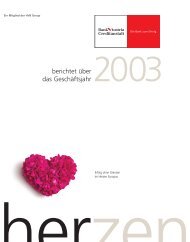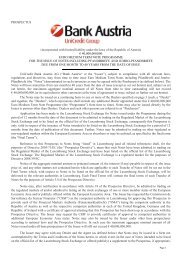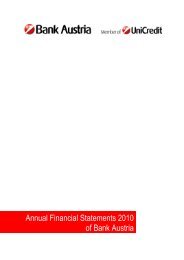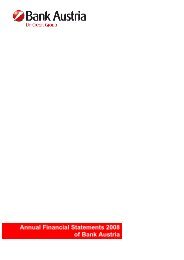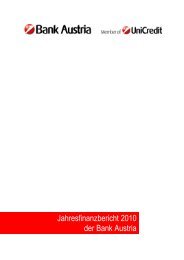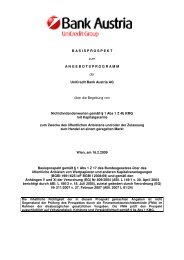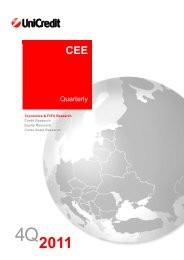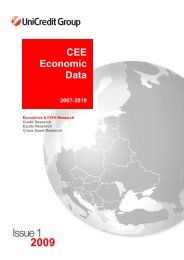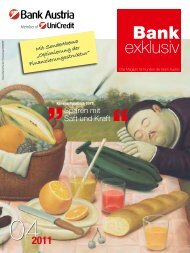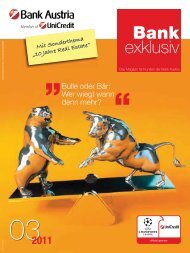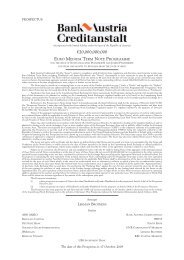Annual Financial Statements 2011 of Bank Austria
Annual Financial Statements 2011 of Bank Austria
Annual Financial Statements 2011 of Bank Austria
You also want an ePaper? Increase the reach of your titles
YUMPU automatically turns print PDFs into web optimized ePapers that Google loves.
Management Report <strong>of</strong> UniCredit <strong>Bank</strong> <strong>Austria</strong> AG<br />
income/expenses from the disposal and valuation <strong>of</strong> securities<br />
valued as financial fixed assets, and <strong>of</strong> shares in group companies<br />
and equity interests (– € 633 m). The latter item includes the writedown<br />
on Greek government bonds held as financial fixed assets<br />
and the results from the disposal and valuation <strong>of</strong> shares in group<br />
companies and equity interests, which were mainly determined by<br />
the adjustment <strong>of</strong> the book values <strong>of</strong> shareholdings in our banking<br />
subsidiaries in Kazakhstan and Ukraine through impairment<br />
charges.<br />
Items in the pr<strong>of</strong>it and loss account for <strong>2011</strong> compared with<br />
the previous year<br />
Net interest income in the reporting year was € 1,390 m, up by<br />
€ 81.6 m or 6.2%.<br />
Income from securities and equity interests decreased by<br />
€ 184.2 m or 26.6% to € 508.4 m in <strong>2011</strong>. The decline was partly<br />
due to the fact that dividend income from credit institutions and<br />
specialised credit institutions in <strong>2011</strong> was down by € 27.9 m, also<br />
because pr<strong>of</strong>its generated by CEE banks in which UniCredit <strong>Bank</strong><br />
<strong>Austria</strong> AG holds interests were retained locally (in 2010, our<br />
Slovak banking subsidiary had paid a large special dividend). But<br />
the main reason for the decline was the sale <strong>of</strong> UniCredit CAIB in<br />
the middle <strong>of</strong> 2010, which resulted in substantial income from the<br />
intermediate holding company in that year.<br />
Net fee and commission income was down by 18% to € 572.7 m.<br />
Fee and commission income declined by 11.9% to € 802.9 m and<br />
fee and commission expenses rose by 8.4% to € 230.2 m. In<br />
lending business, income from guarantees given to CEE banks fell<br />
significantly while risk-related commission expenses vis-à-vis<br />
leasing companies increased. In the securities sector, mutual fund<br />
business declined strongly and commission income from foreign<br />
exchange dealings was also down by about 13%. Among other<br />
services, commission income declined in the areas <strong>of</strong> new building<br />
society savings agreements and insurance contracts.<br />
The item net pr<strong>of</strong>it/loss on trading activities increased to<br />
€ 69.5 m, despite the reorganisation <strong>of</strong> trading activities to focus on<br />
customer-driven business. The figure cannot be directly compared<br />
with the previous year (+ € 35 m) because UniCredit CAIB was<br />
sold within UniCredit Group in 2010.<br />
Operating income in <strong>2011</strong> totalled € 2,615 m and was thus down<br />
by € 225.8 m or 7.92% from the 2010 figure.<br />
In <strong>2011</strong>, general administrative expenses (€ 1,564 m) rose by<br />
€ 102.1 m or 7.0%. Staff costs increased by 8.4% (+ € 73.6 m) to<br />
€ 953.2 m. Other administrative expenses, including those for<br />
services provided by Group-internal service companies, rose by<br />
4.9% (+ € 28.5 m) to € 610.8 m, mainly as a result <strong>of</strong> increases in<br />
the areas <strong>of</strong> advisory services and Information & Communications<br />
Technology (ICT). The major portion <strong>of</strong> the cost increase was due<br />
to structural changes: as part <strong>of</strong> the separation <strong>of</strong> customer-driven<br />
business and trading-related activities <strong>of</strong> UniCredit CAIB AG, a<br />
number <strong>of</strong> UniCredit CAIB AG’s employees were reintegrated in<br />
UniCredit <strong>Bank</strong> <strong>Austria</strong> AG before the banking subsidiary was sold.<br />
Moreover, in the middle <strong>of</strong> 2010, various operations-related<br />
services (Postal Service and Printing Service) were retransferred<br />
from UniCredit Business Partners (UCBP) to the bank, increasing<br />
staff costs and other administrative expenses.<br />
Total operating expenses – including depreciation and<br />
amortisation and other operating expenses, which together did not<br />
change to any significant extent – rose by € 114.6 m or 6.8% to €<br />
1,802 m.<br />
Net expenses from the disposal and valuation <strong>of</strong> loans and<br />
advances as well as securities were € 565.9 m, down by<br />
€ 138.8 m from the previous year. Most <strong>of</strong> the decline resulted from<br />
a reduction <strong>of</strong> write-downs on customer loans. The provisioning<br />
charge (€ 522 m net) for <strong>2011</strong> was down by 23% or € 153 m from<br />
the 2010 figure. Contributions to this further improvement – which<br />
was supported by favourable economic trends in the first six<br />
months <strong>of</strong> the reporting year – came from retail banking and from<br />
business with corporate customers, with the latter also benefiting<br />
from successful restructuring <strong>of</strong> loans.<br />
Net expenses arising from the disposal and valuation <strong>of</strong><br />
securities valued as financial fixed assets rose by € 226.5 m or<br />
55.7% to € 632.9 m. The increase resulted primarily from valuation<br />
losses on securities investments (Greek government bonds). The<br />
European Council decisions made on 21 July <strong>2011</strong> to support<br />
Greece were for the first time accompanied by an <strong>of</strong>fer for the<br />
participation <strong>of</strong> private investors, suggesting an impairment <strong>of</strong> the<br />
investments in Greek government bonds <strong>of</strong> about 21%. The<br />
European Council’s statements <strong>of</strong> intent <strong>of</strong> 26 October <strong>2011</strong> made<br />
a more extensive debt restructuring appear more likely, and<br />
financial markets discounted this factor. Therefore the investments<br />
held as financial fixed assets were written down to the mid-market<br />
prices prevailing as at the end <strong>of</strong> <strong>2011</strong>. This resulted in an expense<br />
<strong>of</strong> € 262 m reflected in the valuation results for financial<br />
investments (including another € 14 m from current assets).<br />
Together with the partly favourable development <strong>of</strong> other financial<br />
investments, the results from the disposal and valuation <strong>of</strong><br />
securities investments were – € 213 m after + € 30 m in the<br />
previous year. Within the item “net income/expenses from the<br />
disposal and valuation <strong>of</strong> securities valued as financial fixed<br />
assets, and <strong>of</strong> shares in group companies and equity interests”, the<br />
results from the valuation and disposal <strong>of</strong> shares in group<br />
companies and equity interests were a net expense <strong>of</strong> € 419 m,<br />
down by € 17 m from the previous year’s figure (2010: – € 436 m).<br />
As part <strong>of</strong> the current multi-year planning process (five-year plan<br />
covering the period from <strong>2011</strong> to 2015) <strong>Bank</strong> <strong>Austria</strong> updated<br />
medium-term scenarios for its business segments and regions.<br />
Compared with the original assumptions made for planning<br />
purposes, the less favourable earnings trend for JSC ATF <strong>Bank</strong> in<br />
Kazakhstan and for PJSC Ukrsotsbank and PJSC Ferrotrade<br />
International in Ukraine required an adjustment <strong>of</strong> the respective<br />
book values in the combined amount <strong>of</strong> € 569 m. This expense<br />
was <strong>of</strong>fset to the extent <strong>of</strong> about one half by positive results from<br />
the valuation and disposal <strong>of</strong> other equity interests; for example,<br />
the 50% interest in the Turkish Koç Finansal Hizmetler A.Ş.<br />
(“KFS”), on which we made a write-down in 2008 following an<br />
impairment test, has in the meantime developed much more<br />
favourably than originally assumed. And the outlook is also<br />
positive, as confirmed in our multi-year plan. This means that the<br />
reasons for the lower valuation were no longer applicable, and we<br />
were able to make a write-up, valuing the equity interest at cost.<br />
The large expense arising from the results <strong>of</strong> valuation and<br />
disposals in <strong>2011</strong> led to negative results from ordinary<br />
business activities in the amount <strong>of</strong> – € 386.3 m (2010:<br />
+ € 41.8 m). After deduction <strong>of</strong> income taxes (€ 21.5 m) and other<br />
taxes (€ 78 m) and after a release <strong>of</strong> reserves, the pr<strong>of</strong>it for the<br />
year was € 100 thsd (2010: € 234 thsd). Together with the pr<strong>of</strong>it<br />
brought forward from the previous year, UniCredit <strong>Bank</strong> <strong>Austria</strong><br />
AG’s accumulated pr<strong>of</strong>it was € 2.4 m.<br />
<strong>Bank</strong> <strong>Austria</strong> – <strong>Annual</strong> <strong>Financial</strong> <strong>Statements</strong> <strong>2011</strong> 190



